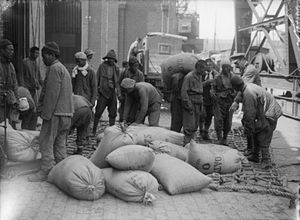When world leaders converged on Paris this past Sunday to commemorate the signing of the armistice that effectively ended World War I 100 years ago, their ranks did not include Xi Jinping.
As the Associated Press reported, “Notably absent will be the president of China.”
The only public presence that China had at the ceremony was a high school student who joined in reading letters from 1918 that serve as contemporaneous accounts of the end of the war. Her letter was written by Gu Xingqing, a worker who was one of tens of thousands recruited from China by Britain and France to join in the war effort.
“The sirens of the factories seemed to be sounding and cries and joyful songs ring out. The end of the war was announced… In the city, there was already a sea of people: men and women, young and old, soldiers and civilians, people of all skin colors marched together, hand in hand, singing or cheering,” Gu wrote.
U.K. Prime Minister Theresa May also was a no-show, but only due to her obligations to attend similar remembrance events in Britain.
Why wouldn’t Xi attend a ceremony that commemorates the ending of history’s bloodiest conflict, a war effort to which Chinese nationals in the tens of thousands contributed in crucial, material ways? Chinese workers served in critical functions during World War I, playing key roles in logistical support to the combatants themselves.
Even more importantly, thousands of Chinese paid the ultimate price. It is estimated by retired Lieutenant Colonel Nigel Collett of the British Army, who is currently vice chairman of the Royal British Legion’s Hong Kong & China Branch, that at least 3,000 Chinese died in Europe alone during the Great War. They are buried in cemeteries throughout Europe, alongside French and British soldiers. Recognition of their sacrifice was rendered this year by visits of Legion members from Hong Kong to more than a third of the 44 graveyards where Chinese remains lie.
Chinese died on the seas as well. As Smithsonian Magazine reports, “More than 500 Chinese laborers aboard the French ship Athos were killed in February 1917 when a U-boat struck the ship.”
Hired on a commercial, contracted basis, Chinese workers dug trenches and worked in munitions factories. They repaired and serviced tanks, and built roads and railways. They “cleaned up” battlefields, a gruesome and thankless job. They were the “largest and longest-serving non-European contingent in World War I,” according to Smithsonian.
The Chinese contribution to WWI has long been overlooked on the international stage. It has also not been well-known or recognized in China itself. But that is changing. Not only did the British Legion honor Chinese workers this year, but a photo exhibit featuring the work and stories of the Chinese Labor Corps was held at the China Exchange in London last week. Many of the archival exhibits came from Shandong Province.
Perhaps Xi’s no-show is a response to a range of insults over a hundred years old: the Western Allies did not want or welcome China’s participation in the war. China was eager to support the Allies, hoping for their support at the end of the war in throwing Japan out of Shandong Province, which it had taken from Germany in 1915. But it was only after turning down the offer to put Chinese troops in Shandong that the Allies finally agreed to take Chinese volunteers as noncombatants.
Russia took as many as 200,000 Chinese workers, France up to 40,000, and Britain 96,000. Much of the recruiting was done in Shandong province itself, among a population hungry for restoration to Chinese sovereignty.
Another humiliation which China had to bear was its limited presence at the table in Versailles. With only two seats to Japan’s five, China surely felt the sting of being subordinated to a nation occupying sovereign Chinese territory.
Among the many punishments that Germany suffered at the hands of the Allies, and which Versailles codified, were the loss of its concessions in Shandong Province. The Allies took those concessions and gave them to Japan, sparking outrage in China. The student protests that resulted led to the resignation of the young Chinese republic’s cabinet, and a refusal by the Chinese government to sign the treaty.
A direct link can be drawn between China’s ineffective response and acquiescence to the terms of the Versailles Treaty ending the war, the social movements that occurred in China as a result, and the rise of socialism in China, of which the current Chinese leadership is the beneficiary.
The post-Versailles social upheaval, known as the May Fourth Movement, created fertile ground for the formation of the Chinese Communist Party, of which Xi Jinping is today the undisputed leader.
Xi missed an opportunity on Sunday. His presence would have been reported widely in China, casting him as a compassionate world leader joining his peers to contemplate and commemorate the senseless loss of millions of lives.
Xi would also have added to his C.V. as a statesman on the international stage, rising above past humiliations, both real and perceived, for the higher cause of honoring combatants and civilians of all nationalities who died in the Great War.
If Angela Merkel could face the ceremony, why couldn’t Xi Jinping?

































